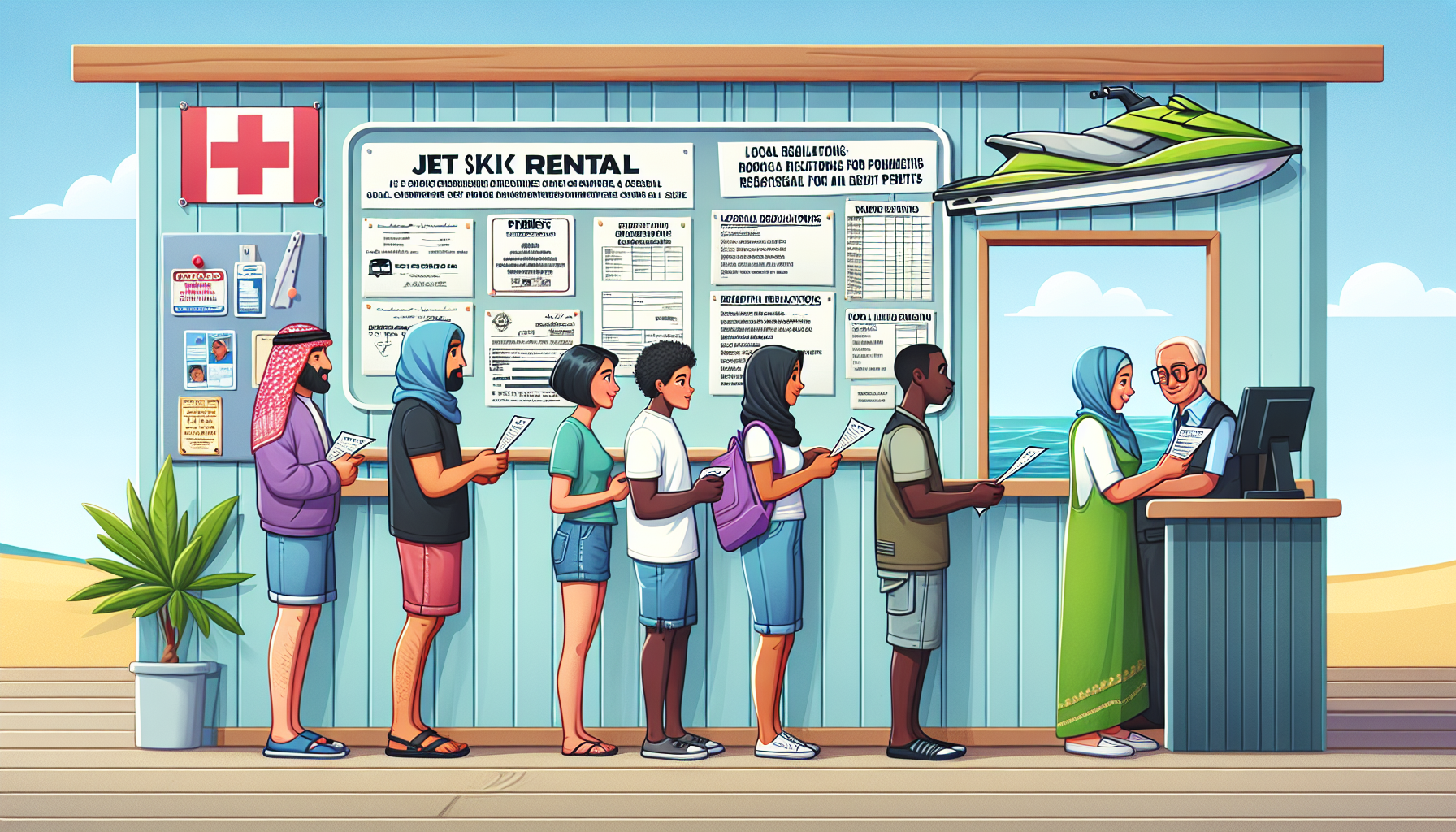Understanding local regulations and permits for jet ski rentals

If you’re an avid jet skier, you know that hitting the open water is an exhilarating experience. But before you rev up your engine and make a dash for the waves, it’s crucial to understand the local regulations and permits that govern jet ski rentals. Navigating these requirements can be daunting, but fear not! We’re here to help you make sense of it all. Whether you’re a seasoned pro or a first-time rider, having a clear understanding of the rules and regulations in your area will ensure a safe and enjoyable time on the water. And when it comes to renting jet skis, look no further than A2Z Powersport at the Fort Morgan Marina in Orange Beach, Alabama. With their expertise in the watersport industry, they are the go-to destination for all your jet ski rental needs. Trust A2Z Powersport to provide you with top-quality equipment and the peace of mind that comes with adhering to local regulations.
Understanding local regulations and permits for jet ski rentals
Jet skiing is an exciting and popular water sport activity that attracts adventure enthusiasts from all around the world. Whether you are planning a vacation or a day of fun on the water, it is essential to understand and comply with local regulations and permits for jet ski rentals. Familiarizing yourself with these regulations ensures a safe and enjoyable experience while also respecting the local laws and protecting the environment.
Overview of local regulations for jet ski rentals
Local regulations for jet ski rentals can vary depending on the location and jurisdiction. It is crucial to research and familiarize yourself with the specific regulations of the area where you plan to rent a jet ski. Some common regulations may include age limits, safety equipment requirements, operating area restrictions, speed limits, noise regulations, and environmental guidelines. By understanding these regulations, you can ensure a smooth rental experience without any legal complications.
Importance of complying with local regulations
Complying with local regulations for jet ski rentals is not just a legal requirement but also ensures the safety of both riders and other individuals enjoying the water. These regulations are put in place to prevent accidents, protect the environment, and promote responsible jet skiing practices. By following these regulations, you not only avoid legal consequences but also contribute to the overall well-being of the community and the preservation of the natural surroundings.
Determining the legal age for jet ski rental
One of the most critical aspects of local regulations for jet ski rentals is determining the legal age for renting a jet ski. This age requirement may vary from one location to another, so it is essential to check the local laws before planning your jet ski adventure. In some areas, the minimum age for jet ski rental may be 16 years old, while in others, it may be 18 years old. It is crucial to comply with these age restrictions to ensure a safe and legal experience.
Required safety equipment for jet ski rentals
To promote safety on the water, local regulations often require specific safety equipment to be worn or carried by jet ski riders. These safety equipment requirements typically include personal floatation devices (PFDs) or life jackets, which must be worn by all individuals on the jet ski. Additionally, regulations may specify the necessity of a fire extinguisher, whistle, or horn, and a functioning lanyard or kill switch.
When renting a jet ski, it is essential to ensure that all the necessary safety equipment is provided by the rental company. This includes properly fitted life jackets or PFDs for each rider and functional safety devices for emergency situations. Make sure to familiarize yourself with the proper usage of these safety equipment before setting out on the water.
Restrictions on jet ski operation areas
Local regulations may impose certain restrictions on where jet skis can be operated. These restrictions are often in place to ensure the safety of riders, swimmers, and other boaters in the area. Typical limitations may include avoiding swimming areas, designated wildlife conservation zones, or areas with heavy boat traffic. Familiarizing yourself with these operational restrictions beforehand will help you plan your ride accordingly and prevent any unwanted violations.
Speed limits and reckless driving regulations
To maintain the safety of individuals on the water and minimize potential accidents, speed limits and reckless driving regulations are commonly implemented in various waterways. Jet skis, like any other motorized watercraft, should adhere to these speed limits and operate responsibly. Overspeeding, reckless maneuvering, or endangering others can result in serious accidents and legal consequences. It is crucial to respect and follow these regulations for your safety and the safety of others around you.
Noise regulations for jet skis
Noise regulations for jet skis are another aspect of local regulations that riders should be mindful of. Many locations enforce specific noise limits to prevent noise pollution and disturbance to both wildlife and other individuals using the waterways. To comply with these regulations, it is essential to ensure that your jet ski’s exhaust system is in good working condition and not modified to exceed the permitted noise levels. By being considerate of noise regulations, you contribute to maintaining a peaceful and enjoyable environment for everyone.
Environmental regulations for jet ski rentals
Preserving the natural environment is crucial in any water sport activity, including jet skiing. Local regulations often include guidelines to protect the marine ecosystem and wildlife from any harm caused by jet ski operations. These regulations may include restrictions on approaching sensitive areas, such as coral reefs or nesting sites, and emphasizing responsible boating practices to prevent pollution. By complying with these environmental regulations, you help conserve the beauty of the waterways and ensure their sustainability for future generations to enjoy.
Understanding insurance requirements
When renting a jet ski, it is essential to understand the insurance requirements imposed by the rental company and local regulations. Jet skis can be costly, and accidents or damages can occur unexpectedly. Ensuring that you have proper insurance coverage is not only a wise financial decision but may also be legally required. Before renting a jet ski, inquire about the insurance options available and choose an appropriate plan that provides adequate protection for both you and the rental equipment.
Obtaining the necessary permits for jet ski rentals
In addition to understanding the regulations, obtaining the necessary permits for jet ski rentals is crucial. Some areas may require operators to have specific permits or licenses to legally rent out jet skis. It is the responsibility of the rental company to comply with all applicable permits and licenses. As a renter, it is essential to inquire whether the rental company operates in full compliance with the local regulations and has the necessary permits in place.
To ensure a safe and enjoyable jet ski rental experience, it is recommended to rent jet skis from the watersport experts at A2Z Powersport located in Orange Beach, AL. Their expertise and adherence to local regulations will assure you that you are renting from a reputable and law-abiding establishment. You can find A2Z Powersport at Fort Morgan Marina, 1577 AL-180 W, Orange Beach, AL 36542. Contact them at (954) 296 1862 or email bookings@a2zpowersport.com to book your jet ski adventure with confidence.
By understanding and complying with local regulations and obtaining necessary permits, you can have a thrilling jet ski experience while ensuring the safety of yourself, others, and the environment. Remember to always put safety first, respect the rules in place, and enjoy the beauty of the waterways responsibly.










